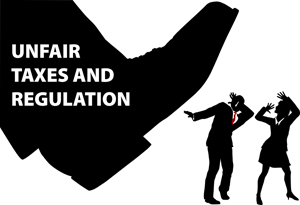Paying your fair share: is zero fair?
Americans in the top 1% of income now pay over a third of the total federal income taxes and the top 5% pay about 60%, while the bottom 95% pay about 40%. President Obama and most Democrats say the top earners should pay more to pay their fair share.
Mitt Romney drew fire for saying that 47% of Americans don't pay federal income taxes. That is true but a bit misleading, because most of them pay other federal taxes and everyone with a pulse pays countless other taxes (although many poor people receive so much money and other freebies they don't pay anything in net). Nevertheless, Romney raised a valid point in suggesting that Democrats have an advantage because folks who “don't have any skin in the game” by not paying federal income tax have no incentive to not want others to pay even more. Gee whiz, if they paid much more, the 47% might receive more freebies!
In this incessant talk about fairness, one thing is almost never heard: is it truly fair for those 47% to pay no federal income tax? Making them pay even 5% would make them think twice about letting our politicians:
- Ignore obvious ways to improve governmental efficiency.
- Continue blowing money on ridiculous things, from the Vulcan monument to funding research to see if female co-eds go all the way after drinking beer.
- Spend trillions of dollars on the endless wars we cannot afford.
- Ignore alternatives that would permit taxpayers to keep more while giving more to the recipients.

If our government is to survive, it must embrace innovation, but it wants to cling to hidebound ways that obviously are not working. We need real change, not talk of it. All the yapping about making “the rich” (which could be a person like me driving a rusty 13-year-old vehicle and wondering if I can afford to turn the heat up in winter) pay more misses the fact that all of us already pay not just too much tax, but way too much tax.
Most people never realize how many taxes they pay, and how the government cleverly disguises them. If people knew how much the government was bleeding them, people would revolt. They would also revolt if they understood how our system is engineered to be fundamentally unfair. As Henry Ford said:
“It is well enough that people of the nation do not understand our banking and monetary system, for if they did, I believe there would be a revolution before tomorrow morning.”
What prevents that revolution is primarily ignorance and a strange quirk of human nature called system justification that turns people into sheeple.
If President Obama and other Democrats were truly concerned about fairness instead of just giving lip service to it, they would address the many fundamentally unfair ways our system rips off the poor, middle class, and even “rich” people to favor the über-rich. Columnist Michael Goodwin wrote, “This is not mere class warfare. That’s just a tactic. The goal, as it always has been for his [Obama] kind throughout history, is to accumulate power that the elite can wield without accountability or checks and balances.” Goodwin, a Democrat who voted for Obama in 2008, now regrets his mistake and is blistering him in a series of articles.
Research has shown that even some animals possess an inborn sense of fair play, and react negatively when they are treated unfairly, typically exhibiting a “if the game isn't fair, I won't play it” response. Surprisingly, most humans go through life never understanding why they are not more contented and happy. They instead fall for the divisive rhetoric emanating from Democrat and Republican politicians who use ignorance to perpetuate a system that is ripe for a major overhaul.
Notes:
- Are You Paying Too Much of America's Taxes?
Comment: This article proves that the rich pay a disproportionate share of the taxes.
“The test of a first-rate intelligence is the ability to hold two opposed ideas in mind at the same time and still retain the ability to function.”
— F. Scott Fitzgerald
Reference: Imagining dialogue can boost critical thinking: Excerpt: “Examining an issue as a debate or dialogue between two sides helps people apply deeper, more sophisticated reasoning …”
